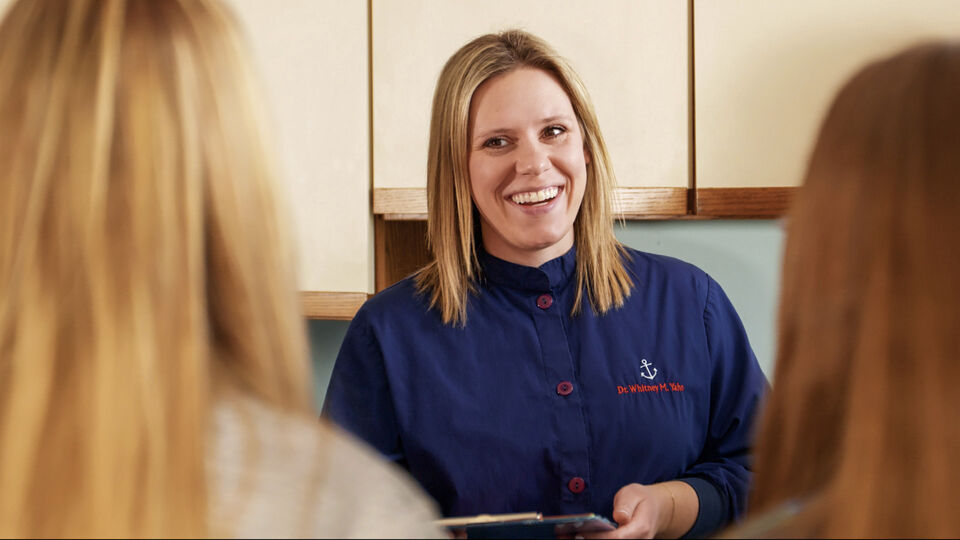
In our FAQ section, we’ve answered the top 10 questions asked by parents and guardians. From the importance of baby teeth to choosing the right toothpaste, our Saginaw, MI, pediatric dentist covers essential topics to help you make informed decisions for your child’s dental health.
Call Great Lakes Bay Pediatric Dentistry today at (989) 792-9201 or contact us online to request an appointment!
Does My Child Need Sealants?
While dental sealants are not mandatory, they are greatly beneficial to children of various ages. Because of how well sealants act as a shield against cavities, many dentists, including ours, recommend they be placed on molars once they fully erupt. We’ll keep an eye on your child’s dental development each time they come in for a teeth cleaningand make the suggestion once the time is right for optimal prevention.
Will My Child Need Braces?
The American Association of Orthodontists (AAO) recommends that children undergo an orthodontic evaluation around the time they turn 7 years old. At this age, your child will have a mixture of baby and permanent teeth so an orthodontist can see how they are all coming in and if any problems are forming.
Generally, our pediatric dentist may recommend your child be evaluated if they have:
- Lost baby teeth prematurely or later than what’s expected for their age
- Crowded, crooked, or misplaced teeth
- A tendency to breathe through their mouth more than the nose
- Problems with biting the inside of their cheeks or top of the mouth
- Difficulty chewing, biting, or speaking
- Displayed excessive grinding or clenching of the teeth
- A crossbite, underbite, overbite, or open bite (where the top and bottom teeth don’t meet)
When Should My Child Start Brushing Their Teeth?
Contrary to popular belief, oral hygiene can begin before teeth have emerged above the gum line. This will mean you are the one cleaning and “brushing”, however, until your child has the ability to hold a toothbrush.
Teeth don’t typically start to appear in your child’s mouth until they are between 6 and 12 months of age, although every child is different. While you’re waiting for teeth to poke through, there are ways you can still clean your baby’s mouth. Our pediatric dentist recommends using a soft, moistened cloth or piece of gauze to wipe their gums after each time they are fed or at least twice a day.
Once your child has all or at least a few of their primary teeth showing, it’s ok to start integrating a small toothbrush and fluoride toothpaste into your routine with them. Generally speaking, this is after they’ve turned 1 but it can happen right after their first tooth appears.
Do Baby Teeth Even Matter?
Baby teeth are often deemed less important because they’re temporary and fall out with time. However, your child’s primary teeth act as placeholders for their incoming adult teeth, help them learn to speak and form words correctly, and can impact the health of their body as they allow them to chew nutritious food. Just because they don’t hang around forever, doesn’t mean baby teeth aren’t essential for your child’s oral development!
When Should My Child Start Seeing the Dentist?
At Great Lakes Bay Pediatric Dentistry, we recommend that your child have their first dental visit and receive an infant oral health exam by the time they turn one or when their first tooth comes in, whichever is sooner. After that, it’s best if your child sees our pediatric dentist at least two times a year.
Are X-Rays Safe for Children?
Yes, X-rays are safe for your child to undergo as the radiation levels are very minimal and like adults, they receive a lead apron to wear as a protective measure. Essential for diagnosing unseen oral health issues, the American Dental Association (ADA) and American Academy of Pediatric Dentistry (AAPD) recommend children have X-rays taken by age 3 to monitor growth and development. In general, they are performed only when necessary.
How Much Toothpaste is Recommended for Kids?
Toothpaste and children is a perfectly fine combination but it’s important to watch the amount that’s given. For kids under 3, only use a small smear of toothpaste that’s equal to a grain of rice. They should not graduate to a pea-sized amount until they are at least 3. We then recommend sticking to this amount until they turn 6 years old.
What Type of Toothbrush Should My Child Use?
It can be overwhelming trying to figure out what toothbrush is best for your little one. Ultimately, you want something that’s comfortable for them to use and gets the job done. Here is a basic guide on brush styles and corresponding ages:
- 0-3: silicone finger slip toothbrush once teeth begin to erupt. After age 1, parents can use a soft-bristled toothbrush with a small head
- 3-5: kid-sized toothbrush; typically, one with a larger handle
- 6-9: kid-sized toothbrush: one with a slimmer handle than those for toddlers
- 10+: adult sized toothbrush
Is Thumbsucking or Pacifier Use Really That Bad?
Babies instinctively know that their inherent sucking reflex guarantees them two things: food and comfort. Preventing your baby from sucking on either a thumb or pacifier can deprive them of a way to calm themselves.
However, once they become toddlers, it’s recommended that they start to move past the sucking instinct they were born with. If you want to avoid issues with how their teeth and mouth develop, aim to abandon the habit by age 2 if possible. If not, by age 4 or 5 is still fine.
Prolonged pacifier or thumb sucking can affect the shape of your child’s mouth and how their adult teeth line up. This does depend on how often, how intensely, and how long the habit occurs. If you can stop them by the time their upper adult teeth show up, the bite may correct itself.
Our pediatric dentist can perform an oral examination and let you know if your child requires orthodontic intervention.
Should I Pull My Child’s Loose Tooth?
The answer to this question depends on a few factors including how loose the tooth is and your child’s anxiety level regarding the situation. Our pediatric dentist advises against forcing any tooth out if it’s not ready, however. If a baby tooth is lost prematurely, it can affect the position of an incoming permanent tooth.
